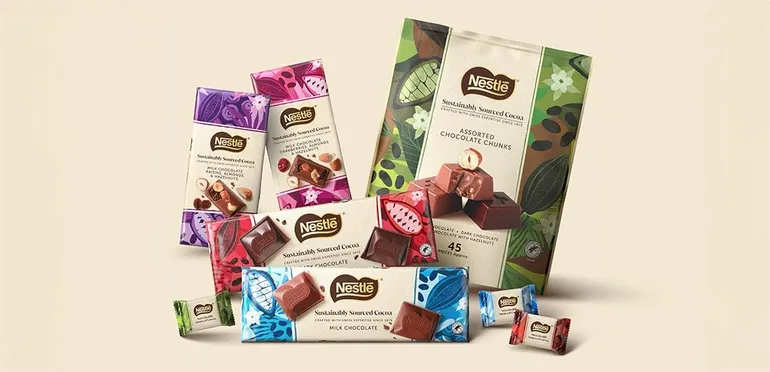Nestlé introduces sustainably sourced chocolate brand

Dive Brief:
- Nestlé is launching Sustainably Sourced chocolates, the food and beverage giant said in a statement. The new confectionery brand will be available this summer in airports around the world.
- The chocolates contain cocoa certified by the Rainforest Alliance and sourced through the Nestlé Cocoa Plan, the CPG giant’s sustainability program.
- Sustainability is one of the primary tools large food and beverage companies are using to not only connect with consumers who value the attribute in the products they buy, but to reduce their own environmental footprint.
Dive Insight:
As travelers head to airport gift shops, a key part of Nestlé’s sustainability efforts will be on full display. Targeting airports around the world provides Nestlé, which has a global presence, with an opportunity to educate more consumers about its sustainability push rather than inundating one specific country.
The launch comes as consumers increasingly seek out products that are sustainably sourced. In travel retail, the sustainability agenda is also gaining momentum, with 71% of travelers stating that it influences their purchasing decisions, Nestlé said, citing ForwardKeys 2022 M1ndset research.
Nestlé Sustainably Sourced chocolate will contain visuals to encourage customers to learn more about the Nestlé Cocoa Plan and its collaboration with the Rainforest Alliance. The Nestlé Cocoa Plan was established 15 years ago to improve the livelihoods in communities, better social conditions for families and increase product sustainability. It has engaged with more than 170,000 families so far, the company said.
Nestlé’s Sustainably Sourced Cocoa will be available in a recyclable paper pouch. It’s a strategy used by other Nestlé confectionery brands such as Smarties, which have transitioned to paper packaging. The pouch will help Nestlé build on the Sustainably Sourced Cocoa mantra as better for the consumer and the environment.
“Through creative branding, we can provide transparency on the origin of the cocoa used in our chocolate,’ said Aura Sanchez, the head of marketing at Nestlé Travel Retail. “It enables us to raise awareness about our longstanding commitments to supporting cocoa-farming families and the long-term sustainability of cocoa production.”
The new chocolate brand is the latest sustainability announcement from Nestlé. In 2022, Nescafe, Nestlé’s largest coffee brand, announced plans to spend more than $1 billion to help the food and beverage giant source coffee more sustainably. And in January, Nestlé launched the first KitKat made with fully traceable cocoa ingredients sourced from farming families it supports.
Few ingredient industries have been thrust in the spotlight in recent years as much as cocoa production. The industry has faced a number of challenges, including fluctuating prices, low farmer incomes, persistent child labor and ongoing impacts from climate change. These challenges have forced cocoa users across the industry to respond.
Earlier this month, Hershey announced it’s looking to expand on its already 100% independently verified cocoa supply chain by establishing full sourcing visibility for its cocoa volume in both the Ivory Coast and Ghana by 2025. Hershey introduced its Cocoa For Good strategy six years ago to improve cocoa communities and help tackle systemic social and environmental challenges.
Other companies, including chocolate ingredients leader Barry Callebaut and Snickers maker Mars Wrigley, also have cocoa sustainability programs in place.
Source: fooddive.com

